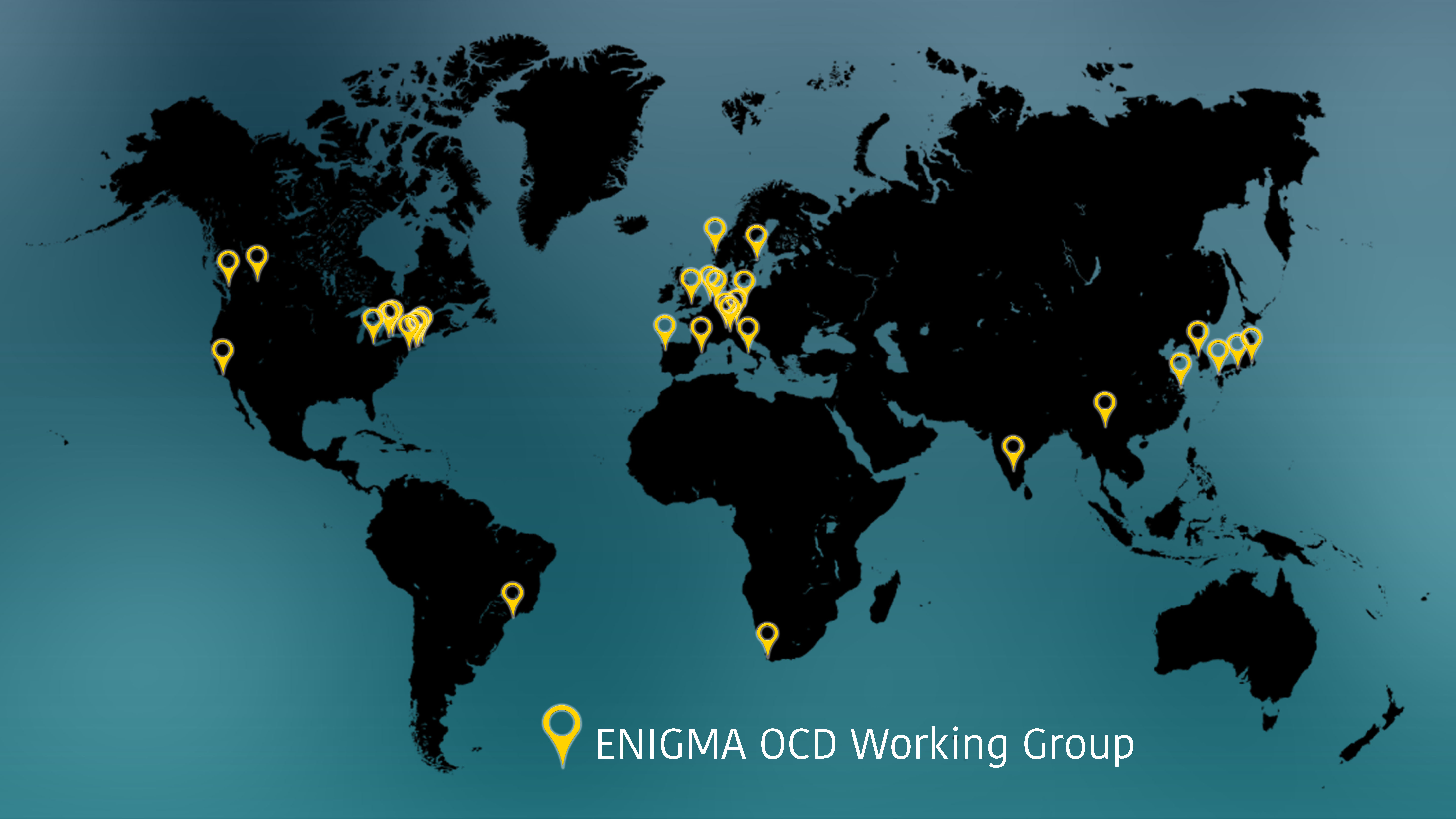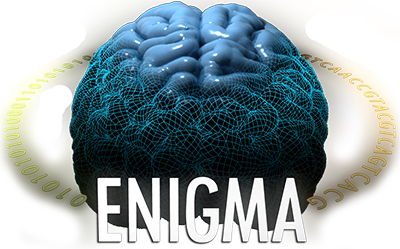
ENIGMA's OCD working group currently consists of 47 samples from 34 institutes in 15 countries on 5 continents, with a total sample of 2,323 OCD patients and 2,325 healthy controls. Initial work has focused on studies of subcortical volume (Boedhoe et al. 2017 Am J Psych), cortical thickness (Boedhoe et al. 2018 Am J Psych), structural connectivity (Yun et al. 2020 Brain), and brain lateralization (Kong et al. 2020 Biol Psychiatry) in children, adolescents and adults with OCD, also including the study on the commonalities and distinctions across different neurodevelopment disorders (Boedhoe et al. 2020 Am J Psych). Additional work is done (and still ongoing) employing machine learning techniques (Bruin et al. 2020 Transl Psych) and diffusion imaging (Piras et al. 2021 Transl Psych). An overview of the first 5 years of ENIGMA-OCD is recently published in the special issue on ENIGMA (van den Heuvel et al. 2020 HBM). New data pipelines are currently running, focusing on thalamus and cerebellum segmentations, voxel-based morphometry, and resting state fMRI data. Task-based fMRI analyses will be possible in the near future.
ENIGMA-OCD has brought together OCD experts from all over the world to re-analyze historical MRI data using meta- and mega-analyses. This has not only resulted in important contributions to the literature on brain alterations in OCD, but has also stimulated international collaboration and sharing of OCD imaging data from sites across the globe. There are many questions still to address in the growing ENIGMA-OCD dataset. The findings and the successful model of international collaboration have already spurred new studies.
Large-scale data-sharing as facilitated by ENIGMA-OCD has accelerated discovery and generated novel hypotheses that are now being pursued. It has also created a model for large-scale global collaboration across OCD experts, and even more broadly, across working groups focused on a range of disorders and methodologies. By joining forces, we can help to shift the research model from local and mono-disciplinary to global and multidisciplinary and increase rigor and transparency. In the end, we share a common goal: developing a circuit-based approach to different cognitive and clinical dimensions of OCD that can help transform how OCD and related mental disorders are conceptualized, diagnosed, and ultimately treated around the world.
We are happy to welcome new cohorts at any time! If you would like to receive more information and/or are willing to participate in this initiative by sharing your data, please contact Prof. dr. Odile van den Heuvel (oa.vandenheuvel@amsterdamumc.nl) and Prof. dr. Dan Stein (dan.stein@uct.ac.za).
- ENIGMA OCD MOU guidelines to participate
- ENIGMA OCD list of participating groups
- ENIGMA OCD members page (password-protected)
Projects and their status
Published
- Subcortical Volume, published in American Journal of Psychiatry 2017
Premika Boedhoe and Odile van den Heuvel
Amsterdam UMC, Vrije Universiteit Amsterdam, Amsterdam, The Netherlands
"Distinct Subcortical Volume Alterations in Pediatric and Adult OCD: A Worldwide Meta- and Mega-Analysis"
Cortical Thickness & Surface Area, published in American Journal of Psychiatry 2018
Premika Boedhoe and Odile van den Heuvel
Amsterdam UMC, Vrije Universiteit Amsterdam, Amsterdam, The Netherlands
"Cortical Abnormalities Associated With Pediatric and Adult Obsessive-Compulsive Disorder: Findings From the ENIGMA Obsessive-Compulsive Disorder Working Group"
Structural Covariance, published in Brain 2020
Je-Yeon Yun and Jun Soo Kwon
Seoul National University Hospital College of Medicine, Seoul, South Korea
"Brain structural covariance networks in obsessive-compulsive disorder: a graph analysis from the ENIGMA Consortium"
Diffusion Imaging, published Translational Psychiatry 2021
Fabrizio Piras and Gianfranco Spalletta
Neuropsychiatry Laboratory, IRCCS Santa Lucia Foundation, Rome, Italy
"White Matter Microstructure and its Relation to Clinical Features of Obsessive-Compulsive Disorder: Findings from the ENIGMA OCD Working Group"
Structural Lateralization, published in Biological Psychiatry 2020
Xiangzhen Kong and Clyde Francks
Max Planck Institute for Psycholinguistics, Nijmegen, The Netherlands
"Mapping Cortical and Subcortical Asymmetry in Obsessive-Compulsive Disorder: Findings from the ENIGMA Consortium”
Cross-disorder ASD ADHD OCD, published in American Journal of Psychiatry 2018
Premika Boedhoe and Odile van den Heuvel (representing the OCD working group)
Amsterdam UMC, University of Amsterdam, Amsterdam, The Netherlands
Daan van Rooij and Jan Buitelaar (representing the ASD working group)
Martine Hoogman and Barbara Franke (representing the ADHD working group)
Radboud University Nijmegen, Nijmegen, The Netherlands
"Subcortical Brain Volume, Regional Cortical Thickness, and Cortical Surface Area Across Disorders: Findings From the ENIGMA ADHD,ASD, and OCD Working Groups”
Machine Learning, published in Translational Psychiatry 2020
Willem Bruin, Jonathan Shock, Dan Stein and Guido van Wingen
Amsterdam UMC, University of Amsterdam, Amsterdam, The Netherlands
"Machine learning benchmarks for the classification of OCD”
Meta vs. Mega Analysis Methods, published in Frontiers 2019
Premika Boedhoe, Odile van den Heuvel and Jos Twisk
Amsterdam UMC, Vrije Universiteit Amsterdam, Amsterdam, The Netherlands
"Premika Boedhoe, Odile van den Heuvel and Jos Twisk Amsterdam UMC, Vrije Universiteit Amsterdam, Amsterdam, The Netherlands”
Virtual Histology, published in JAMA Psychiatry 2020
Yash Patel and Tomas Paus
Institute of Medical Sciences, University of Toronto, Toronto, ON, Canada Holland Bloorview Kids Rehab. Hospital, Toronto, ON, Canada
"Investigating the neurobiology of psychiatric illnesses: A virtual histology approach”
Ongoing projects
- Medication Effects, manuscript in preparation
Iliyan Ivanov
Icahn School of Medicine at Mount Sinai, New York, NY, United States
Joseph O’Neill
David Geffen School of Medicine at UCLA, Los Angeles, CA, United States
"Medication effects on subcortical morphology across the life span in OCD: Results from the international ENIGMA Consortium"
Polygenic Risk Score
Shareefa Dalvie and Dan Stein
University of Cape Town, South Africa
"Polygenic Risk Score, cortical thickness, surface area and subcortical volumes in OCD"
Longitudinal Treatment Effects, manuscript in preparation
Sara Bertolin, Ignacio Martínez-Zalacaín and Carles Soriano-Mas
Bellvitge Biomedical Research Institute-IDIBELL, Barcelona, Spain
"Brain morphometry and cognitive-behavioral therapy (CBT) in OCD: Prediction of CBT response from pre-treatment scans"
Scalable Deep Learning
Jiook Cha, Rachel Marsh and Helen Blair Simpson
Columbia University, New York , NY, United States
New York State Psychiatric Institute, New York , NY, United States
"Scalable deep learning analytics to ENIGMA OCD imaging data for to classify OCD”
Functional Connectomics
Willem B. Bruin and Guido van Wingen
Amsterdam UMC, University of Amsterdam, Amsterdam, The Netherlands
"Functional Connectomics in OCD"
Voxel Based Morphometry
Matthew Kempton and Anthony James
Institute of Psychiatry, Psychology & Neuroscience, King’s College London
Odile van den Heuvel
Amsterdam UMC, Vrije Universiteit Amsterdam, Amsterdam, The Netherlands
"ENIGMA Voxel Based Morphometry meta-analysis of regional brain volume in patients with OCD"
Predicting CBT Outcome Using fMRI
Willem B. Bruin and Guido van Wingen
Amsterdam UMC, University of Amsterdam, Amsterdam, The Netherlands
"Predicting CBT outcome using functional MRI in OCD”"
Thalamic Segmentation
Chris Vriend, Niels de Joode, Selina Kasprzak and Odile van den Heuvel
Amsterdam UMC, University of Amsterdam, Amsterdam, The Netherlands
"The thalamus and its subnuclei – a gateway to obsessive-compulsive disorder"
Analysis plans in preparation
- Cerebellum
Srinivas Balachander, Janardhanan C. Narayanaswamy, Ganesan Venkatasubramanian and Y.C.Janardhan Reddy
OCD clinic, Department of Psychiatry, National Institute of Mental Health And Neurosciences (NIMHANS), Bangalore, India
"Cerebellar volumetric analysis in Obsessive-Compulsive Disorder"
Cross-disorder PTSD
Rajendra A. Morey
Duke University School of Medicine, University in Durham, NC, United States
Publications
- Cortical Thickness & Surface Area
Boedhoe, P. S., Schmaal, L., Abe, Y., Alonso, P., Ameis, S. H., Anticevic, A., ... & Bollettini, I. (2018). Cortical abnormalities associated with pediatric and adult obsessive-compulsive disorder: findings from the ENIGMA Obsessive-Compulsive Disorder Working Group. American Journal of Psychiatry, 175(5), 453-462.
- Meta vs. Mega Analysis Methods
Boedhoe, P. S., Heymans, M. W., Schmaal, L., Abe, Y., Alonso, P., Ameis, S. H., ... & Beucke, J. C. (2019). An empirical comparison of meta-and mega-analysis with data from the ENIGMA obsessive-compulsive disorder working group. Frontiers in neuroinformatics, 12, 102.
- An Overview of the First 5 Years of ENIGMA OCD
van den Heuvel, O. A., Boedhoe, P. S., Bertolin, S., Bruin, W. B., Francks, C., Ivanov, I., ... & Paus, T. (2020). An overview of the first 5 years of the ENIGMA obsessive–compulsive disorder working group: The power of worldwide collaboration. Human Brain Mapping.



